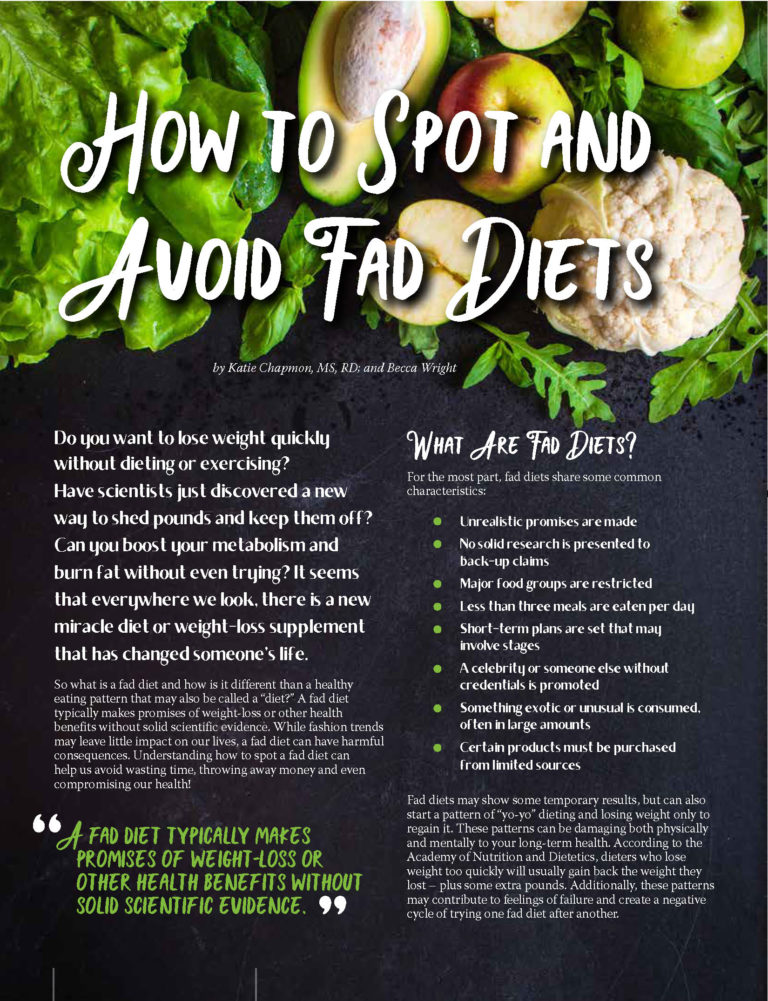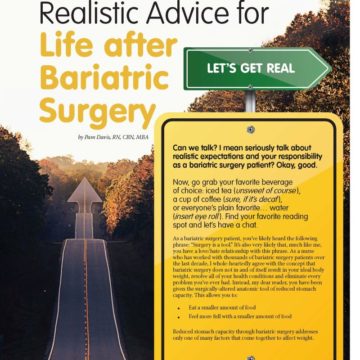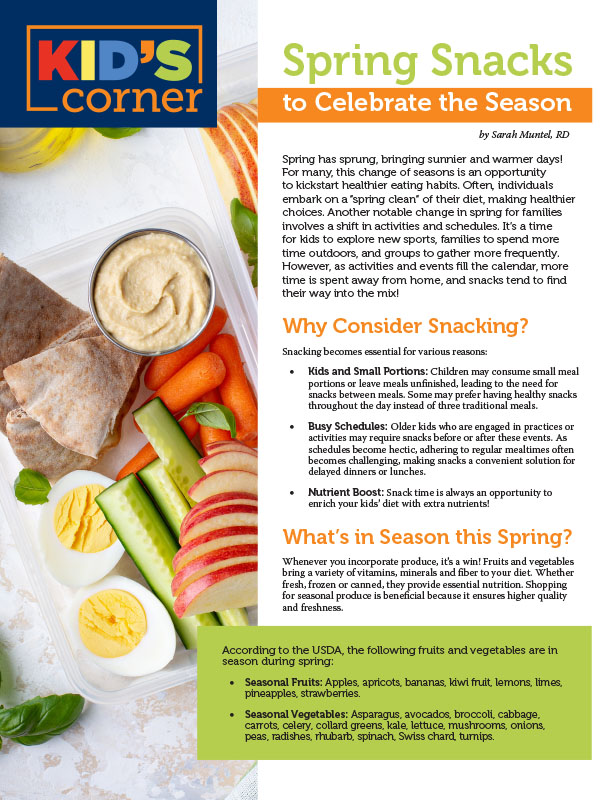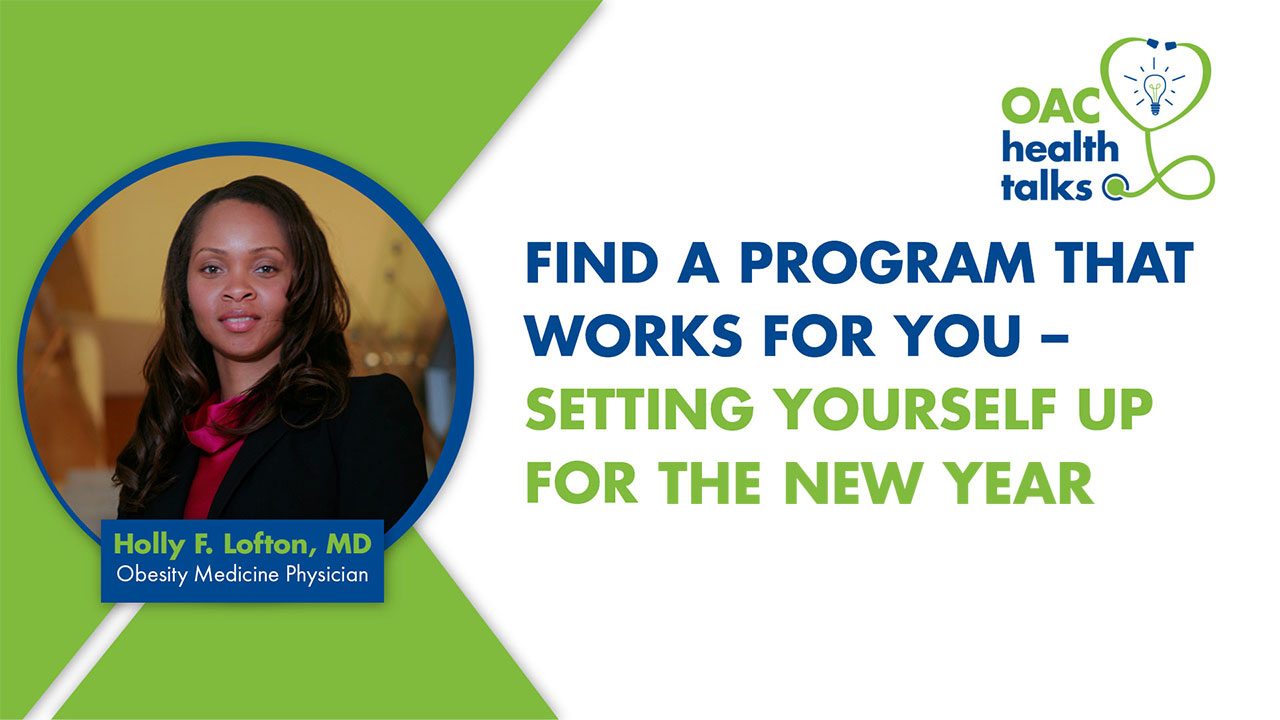How to Spot and Avoid Fad Diets


by Katie Chapmon, MS, RD; and Becca Wright
Summer 2018
Do you want to lose weight quickly without dieting or exercising?
Have scientists just discovered a new way to shed pounds and keep them off?
Can you boost your metabolism and burn fat without even trying? It seems that everywhere we look, there is a new miracle diet or weight-loss supplement that has changed someone’s life.
So what is a fad diet and how is it different than a healthy eating pattern that may also be called a “diet?” A fad diet typically makes promises of weight-loss or other health benefits without solid scientific evidence. While fashion trends may leave little impact on our lives, a fad diet can have harmful consequences. Understanding how to spot a fad diet can help us avoid wasting time, throwing away money and even compromising our health!
What Are Fad Diets?
For the most part, fad diets share some common characteristics:
- Unrealistic promises are made
- No solid research is presented to back-up claims
- Major food groups are restricted
- Less than three meals are eaten per day
- Short-term plans are set that may involve stages
- A celebrity or someone else without credentials is promoted
- Something exotic or unusual is consumed, often in large amounts
- Certain products must be purchased from limited sources
Fad diets may show some temporary results, but can also start a pattern of “yo-yo” dieting and losing weight only to regain it. These patterns can be damaging both physically and mentally to your long-term health. According to the Academy of Nutrition and Dietetics, dieters who lose weight too quickly will usually gain back the weight they lost – plus some extra pounds. Additionally, these patterns may contribute to feelings of failure and create a negative cycle of trying one fad diet after another.
Why Are We So Attracted to Fad Diets?
- We like black and white thinking such as “eat this, never that.”’ Moderation is harder
- We like a challenge and the feeling of accomplishment we get from “sticking to”’ a diet
- We want to make a drastic change and we want to see results right away
- We want to keep up with the latest trends
- We may not feel confident in our ability to make healthy lifestyle changes
When you’re trying to lose weight, it’s normal to be curious about any new breakthrough that might help. Exercising and eating healthy foods in small portions may seem difficult and boring at times. The thought of instant gratification can be tempting. Why not give the latest diet a try?
Some fad diets include elements of a healthful diet like avoiding added sugar, processed foods and eating plenty of fruits and vegetables. However, fad diets have an added component that is unnecessary, not based in research and is potentially harmful. For example: being allowed to eat an unlimited amount of protein. We all need protein. However, consuming far too much of it places strain on the kidneys. In addition, marketed supplements can cause side effects or interactions with medications and not the advertised results.
Adhering to any strict diet can be isolating. Fad dieters may have difficulty dining with others – either at home or dining out with family and friends. Eating can become a chore and cravings can become unbearable. There are ways to think about what we eat in a more practical and sustainable way.
Better Weight-loss Options
Weight-loss can be achieved through healthy lifestyle changes. For alternative ways to benefit from weight-loss, consider the healthier options listed further in this article. These tools can be used to keep you on-track when faced with the temptation of fad diets.
Fad Diet Substitutes
Fad: Juicing
Healthier Option: Juicing can spike your blood sugar and remove fiber that is needed for fullness and digestion. Chewing solid food helps you feel fuller longer.
Fad: Smoothies
Healthier Option: Whether you make them at home or purchase them, smoothies can contain a surprising amount of calories and simple sugars. Opt for solid foods when you have a choice.
Fad: Broths
Healthier Option: Broth can be high in saturated fat and low in some vitamins. Eat a variety of foods including all the major food groups, especially fruits and vegetables.
Fad: Gluten-free
Healthier Option: Gluten is the main protein found in whole-wheat products. Unless you have celiac disease, a wheat allergy or gluten intolerance, there is no reason to avoid gluten. Gluten-free foods aren’t always healthier and can contain more fat and sugar.
Fad: “Crash diets to lose a lot of weight quickly
Healthier Option: Healthy lifestyle changes can result in one to two pounds of weight-loss per week on average. When you crash diet, you lose water and sometimes muscle.
Fad: Going for long periods of time and not eating
Healthier Option: Your metabolism may slow down if your body thinks it’s starving. Eating three meals a day, including breakfast, is a healthy pattern. If you get hungry between meals, make sure you have healthy snacks on hand.
Fad: Highly restrictive diets
Healthier Option: Flexible eating patterns are more effective for weight-loss than strict ones. Denying yourself certain foods may lead to cravings and a loss of some important nutrients.
Fad: Cleanses
Healthier Option: Your body naturally eliminates toxins using the kidneys, liver and skin. It’s best to shift your focus to what you put in rather than what you can “get out.”
What is known to be effective for weight-loss is choosing to make small adjustments in our daily lives that we can stick to. Certain dietary patterns have consistently shown health benefits and may be recommended by your healthcare provider or dietitian. For instance, the Mediterranean Diet or the DASH Diet both include lean protein, fruits, vegetables, whole grains and low-fat dairy products. They focus on whole foods and are low in saturated fat, added sugars and sodium.
Adjusting your portion sizes, cutting back on high-calorie foods and getting more physical activity can lead to healthy weight-loss. Remember that people lose weight in different ways and at different rates. Men have more lean muscle than women, so weight-loss may seem more rapid for them at first. Also, “weight plateaus,” or times when your weight doesn’t change, are very common. It may help to think of your path more like a staircase than a straight line, with alternating times off weight-loss and weight maintenance – even when you’re doing exactly the same things. Try to focus on other measures of success such as dropping a clothing size, feeling increased energy or just feeling better overall.
If you’re frustrated with your weight-loss progress, there are some strategies that can help you regain your motivation. Ask for support from a friend or join a group to assist you with your goals. Look for healthy recipes online or try a new food. If you’ve been doing everything you think you should do, but you aren’t seeing results, reach out to your healthcare provider or dietitian. They may discuss new options to help you.
Here are some overall tips to keep in mind:
- Aim for Balance – Fill half your plate with non-starchy vegetables and choose lean proteins, low-fat dairy options, whole grains and fresh fruits.
- Go for Nutrients – Choose nutrient-dense foods over foods high in calories but low in nutrients.
- Don’t Starve Yourself – Start with a basic plan of three meals a day and add healthy snacks if you get hungry in-between.
- Start the Day Right – Have a hearty breakfast that includes protein in the morning.
- Limit Processed Foods – This is especially true for those high in added sugar, sodium and saturated fat.
- Moderation is Key – Be wary of all-or-nothing thinking.
Conclusion
When something sounds too good to be true… it usually is. There is no quick fix to help you maintain a healthy body weight. The good news is that your team of healthcare providers and dietitians are available to help you figure out what works for you – an individual plan that fits your schedule and life.
Trust your instincts when you hear new information. Be skeptical of un-credentialed individuals who make big promises. Do their claims sound realistic? Are they just trying to sell you something? A healthy diet shouldn’t cost a lot or make you miserable. Find a great support team to guide you, and remember that small changes can make a big impact in the long-run!
About the Authors:
Katie Chapmon, MS, RD, is a Los Angeles-based Registered Dietitian specializing in the field of metabolic surgery and weight management since 2008. She currently serves as the Bariatric Nutrition Lead for Kaiser Permanente as well as Department Manager for the West Los Angeles Bariatric Medicine Department. Additionally, Ms. Chapmon serves as the Co-chair for the American Society for Metabolic and Bariatric Surgery (ASMBS) Integrated Health Clinical Guidelines and Issues Committee Chair as well as Co-chair of the American Academy of Nutrition and Dietetics (AND) Weight Management Dietetic Practice Group (WM DPG) Networks Committee.
Becca Wright recently finished her dietetics internship at California State University, Los Angeles and will soon complete her Master’s degree in Nutritional Science. When she becomes a dietitian, she would like to work in obesity medicine, helping people to live healthier lives and attain their goals. She has great respect for those struggling with their weight and facing stigma.
by Sarah Muntel, RD Spring 2024 Spring has sprung, bringing sunnier and warmer days! For many, this…
Read Articleby Nina Crowley, PhD, RD (with Inspiration from Shawn Cochran) Winter 2024 Dating, no matter your age,…
Read ArticleWith the holidays behind us and 2022 now here, many of us are ready to tackle our…
View Video










